
Seminar discusses innovations in 21st century education
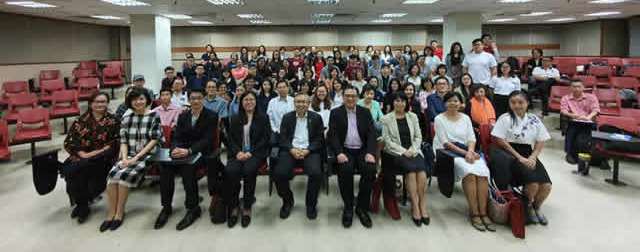
Front row (left): Dr Ngeow Yeok Meng, Dr Ng Bun Chen, Speakers Dr Chen Kah Pin, Fun Bee Lee, UTAR President Ir Prof Dr Ewe Hong Tat, Seminar Chairperson Dr Chong Siou Wei, Chia Gaik Nooi, Kiu Yee Ni and Beh Sun Yin taking a group photo with participants
A seminar titled "Global Highlight for Future (GHF): Education Innovation Seminar" was held at UTAR Sungai Long Campus on 7 September 2019 to provide a platform for speakers to share with participants their award-winning experience of experimenting innovation in the 21st century education, whilst promoting dialogue and exchange among teachers across different regions.
The seminar was jointly organised by UTAR Institute of Chinese Studies (ICS), Sayling Wen Cultural and Educational Foundation, and Global Highlight for Future Hub (GHFhub). The opening ceremony saw a video screening in which GHFhub Creative Director-cum-National Chengchi University Founder for the Graduate Institute of Technology, Innovation and Intellectual Property Management Prof Wu Se-Hwa congratulated the GHF Innovative Education (Malaysia) award-winning fellows on their achievement. He also expressed his anticipation to collaborate with the GHF fellows in the video.
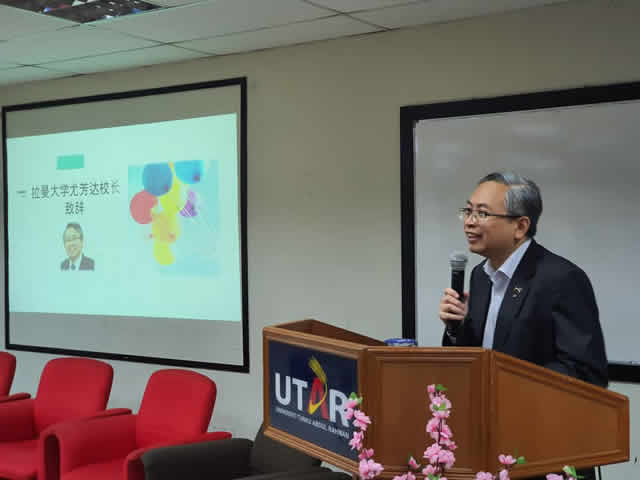
Prof Ewe
Speaking at the opening remark, UTAR President Ir Prof Dr Ewe Hong Tat expressed his appreciation to GHF Innovative Education (Malaysia) Fellows for sparing their time travelling from Terengganu, Penang and Klang to share their innovative teaching practices, "Prior to the GHF fellows' selection round in Malaysia, I was very honoured to be invited to Taiwan as one of the judges for the GHF Innovative Education competition. I had the opportunity to see how educators from different school backgrounds innovatively develop contextualised and suitable methods to teach the local students," said Prof Ewe.
"According to research, when we pay attention and focus on something, our brain goes into a state of flow, which is an 'optimal state of consciousness where we feel our best and perform our best'. However, there is also an area in our brain called the 'Default Mode Network'. It usually occurs when we are out of focus and this would often lead one to think negatively and become anxious. Hence, if we understand how attention span can be prolonged and enhanced, we can encourage our students to focus on their interests and cultivate their concentration. This, I believe, just like sports can produce dopamine in the brain, which helps to create feelings of pleasure and reward that will bring a great positive impact in their future undertakings," said Prof Ewe.
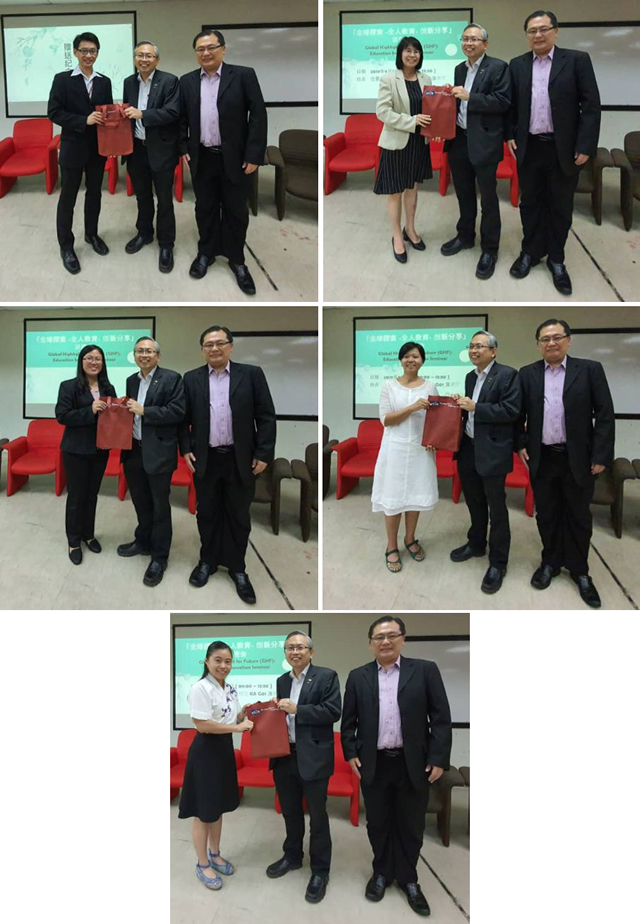
Prof Ewe (middle) presenting a token of appreciation to speakers (clockwise from left) Dr Chen, Chia, Kiu, Beh and Fun while Dr Chong looks on
A total of five speakers showcased their creative ideas on innovative educational methods. Each speaker was given 45 minutes to present in a group or individually.
Dr Chen presenting "21st Century University Education"
UTAR Assistant Professor Ts Dr Chen Kah Pin presented on "21st Century University Education". He is currently lecturer at the Lee Kong Chian Faculty of Engineering and Science, the Programme Coordinator for Curriculum Development (Science and Technology Programmes) as well as the 2017 UTAR Teaching Excellence Award Winner (Online Learning). Drawing linkages between Chinese classical text (The Great Learning) and the current focus of The Fourth Industrial Revolution (IR 4.0), he highlighted the importance of virtue in innovation in the past, present and future. For example, the Great Learning guides readers in manifesting ones' bright virtue, loving people and achieving perfect goodness, whilst IR 4.0 provides innovative solutions to resolve human errors and enhances our standard of living. "Uber is one of the examples of the success models. It is an American multinational transportation network company. However, it does not own any transport. The same goes to Airbnb and Netflix, to name a few. These were all produced through innovative thinking. IR 4.0 is about machine learning; as an educator should we preserve our traditional teaching method or learn like the machine?" He then shared the three major learning methods in the 21st century, "The first learning method is called 'Heutagogy'." Quoting a Chinese playwright Yang Jiang, he said, "Good education begins with inspiring people's interest in learning. Let the children be educated imperceptibly and changed subtly. The second learning method is called 'Paragogy' where students interact with other students (peers) to attain educational goals. The third method is called 'Cybergogy' where students practice self-study, guided or independent learning, empowering them the autonomy to manage and schedule own learning, all by themselves. In line with e-learning, the Ministry of Education has implemented formal Massive Open Online Courses (MOOC) to enable credit transfer and micro-credentials for those who opt for less formal curriculum. But of course, some tests are needed to ensure that students' learning outcomes can be achieved without having structured classroom settings."
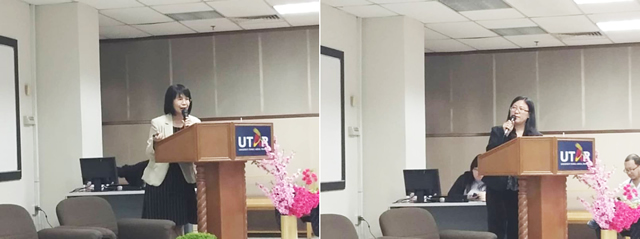
Chia (left) and Fun presenting "Managing a micro-sized and rural primary school"
The second presenters were SJK(C) Kuala Kemaman, Terengganu former Headmistress Chia Gaik Nooi and current Headmistress Fun Bee Lee with their presentation titled "Managing a micro-sized and rural primary school". Chia and Fun won the 2018 GHF Innovative Education (Malaysia) award with their "Honey Bee Programme" launched since 2013. During the presentation, a video on SJK(C) Kuala Kemaman in the year 2005, was played by Chia. "When I was first transferred to SJK(C) Kuala Kemaman, I was shocked because there were only a few enrolments," said Chia. She then shared with the participants on how she brought the school on track, "Although we were more than happy with the increment of enrolment, we also faced some difficulties. Parents chose to send their kids to our school particularly when their kids were in need of special care. Moreover, we were short of manpower as we only had seven school teachers including one part-timer."
"Our goal was to make our school a place where children would want to go every day. In 2013, we launched the 'Honey Bee Programme' to stimulate the interest of the students, making them think positive, committed to learning, well-mannered, good and disciplined," said Chia. Fun, on the other hand, said," Recently, we went to Taiwan and visited some of the schools. It was a beneficial visit because we gained the opportunity to see how others manage their schools. We also discovered some ideas to enhance our teaching methods as well." Besides character building, the school is committed to creating a quality environment, developing school characteristics and effectively integrating and utilising the resources to enhance students' learning outcomes.
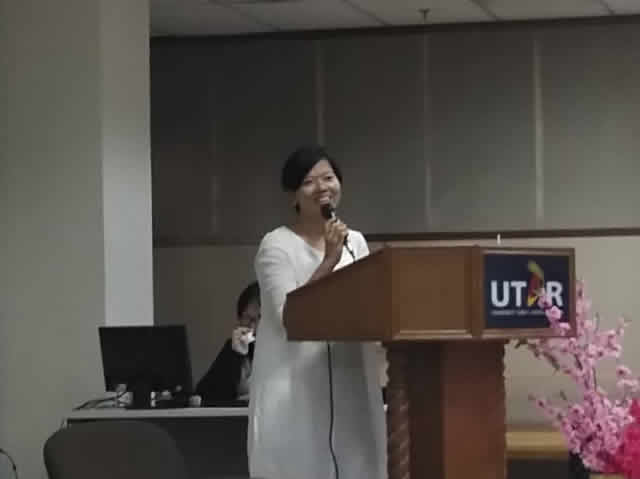
Kiu presenting "Humanising and localising early childhood education"
The third presenter, Kiu Yee Ni is the founder of Windmill Care Centre, who is also one of the 2018 GHF Innovative Education (Malaysia) Fellows. The title of her presentation was "Humanising and localising early childhood education". "Our school is different compared to other care centres; our first differentiating factor is 'Human and Nature'. As we advocate human and nature, our students have more outdoor activities. We do not provide textbooks for teaching purpose, instead, we use nature as study materials for our students. We have our own farm and orchard at our school. Children help to reap vegetables and fruits from the orchard, which serves as a playground. This way, they get to play around, at the same time it is aesthetically pleasing through contact with nature," said Kiu.
She added, "Our children enjoy integrating with nature. It helps them to ignite curiosity, and become aware of nature through discovery and observation. It also helps them to work together, cultivate tacit understanding and develop a strong friendship through nature education. The second factor involves 'Human and Society'. We teach them to communicate and interact with others, and in particular, to care for society. For example, they distribute mandarin oranges to our neighbours during Chinese New Year, visit elderlies who stay alone. With some guidance, children also get to vote for their own representative and to be in charge of solving problems that take place in the centre. We train them to become self-independent. The third factor involves 'Human and Self'. Our students are taught to do meditation for 16 minutes which helps them to get along with themselves."
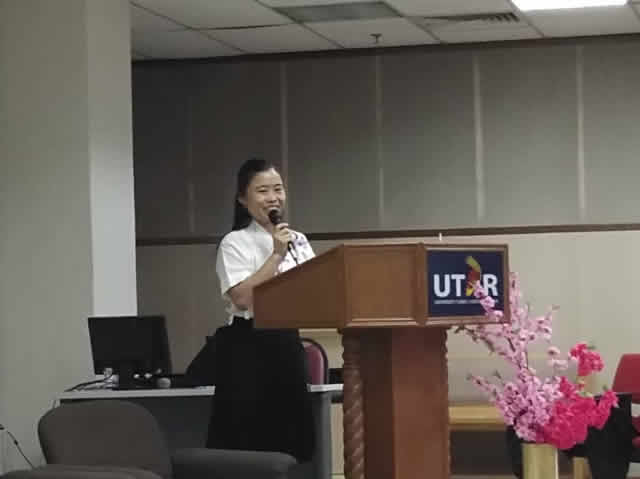
Beh presenting "Man Man Learning Classroom"
The last presenter was SJK (C) Pai Teik, Penang teacher Beh Sun Yin, also one of the 2018 GHF Innovative Education (Malaysia) Fellows. She presented on the formation and development of "Man Man Learning Classroom". Beh shared how "Man Man Learning Classroom" method materialised after attending a workshop in 2016. "I was motivated to invent my own teaching method to help students understand the content in the textbook using mind-mapping concept. Since then, I have introduced four types of mind mapping methods in my classroom, namely paragraph summarisation, story character analysis, event description and element summarisation. As an outcome, this method helped students to improve their reading capability, self-learning ability, creativity and also their ability to work in a team. On top of that, it also helped teachers to be more systematic, especially in texts reading and contexts summarisation. I am happy that I have received positive feedback from the parents as well," said Beh.
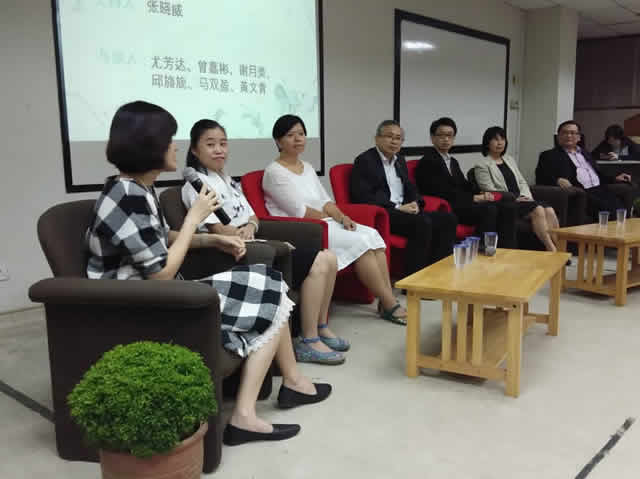
From left: Dr Ng, Beh, Kiu, Prof Ewe, Dr Chen, Chia and Dr Chong
The seminar ended with a comprehensive panel discussion between Prof Ewe, UTAR ICS academic Dr Ng Bung Chen, Dr Chen, Chia, Kiu and Beh. The discussion saw them explaining and sharing their opinion on educational innovation. The session was chaired by ICS Dean Dr Chong Siou Wei. An interactive Q&A session also took place during the discussion.
A participant from New Era University College Teng Heng Lan, a senior lecturer said, "This seminar is truly beneficial because I got the opportunity to learn from the speakers, especially when they share their teaching experience, self-reflection and strategies. In education, we educators needs companionship and encouragement, and a platform to meet and learn from innovative speakers. I hope more seminars like this are held frequently to benefit more people."
Mayfield Kindergarten teacher, Teh Shing Yi said, "I find the presentations interesting. It helped me to look into humanistic education from a different angle. Also, the interaction between the speakers and the audience was meaningful because we get to learn more about the rationale of certain practices when they discuss together. Overall, this seminar was worthwhile and it should be organised again in the future."
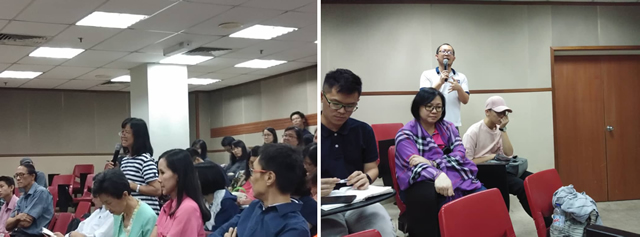
Participants during the Q&A session
![]()
© 2019 UNIVERSITI TUNKU ABDUL RAHMAN all>DU012(A).
Wholly owned by UTAR Education Foundation Co. No. 578227-M LEGAL STATEMENT TERM OF USAGE PRIVACY NOTICE